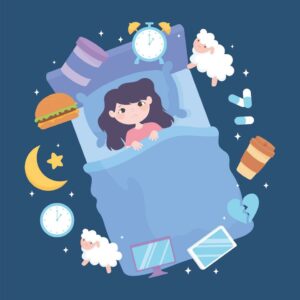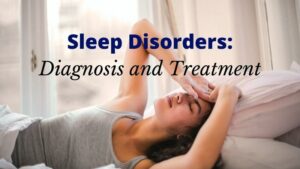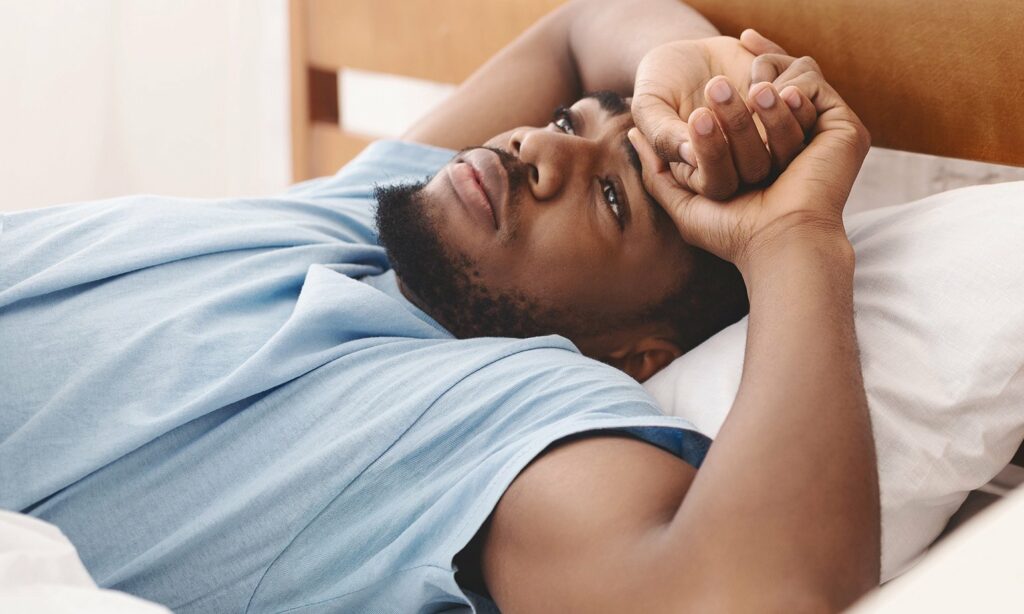There are different types of Sleep Disorders and they affect your sleep quality. Sleep disorders include insomnia, sleep apnea, narcolepsy, and more. Each sleep disorder varies in severity and treatment options, so it’s important to know what you might be dealing with before you start trying to find a solution!
Contents
- 1 What Is A Sleep Disorder?
- 2 Symptoms Of Sleep Disorder
- 3 Types Of Sleep Disorder
- 4 Causes Of A Sleep Disorder
- 5 Diagnosis Of Sleep Disorder
- 6 Treatment Of Sleep Disorder
- 7 How Does Lifestyle Affect Your Sleeping Patterns?
- 8 Lifestyle Changes To Treat Sleep Disorder
- 8.1 Going to bed and waking up at the same time each day
- 8.2 Exercise Regularly
- 8.3 Create A Relaxing Bedroom Environment
- 8.4 Avoid Caffeine Before Bed
- 8.5 Release Stressful Thoughts
- 8.6 Eat Nutritious Diet
- 8.7 Get Plenty of Sunlight
- 8.8 Avoid Drinking Alcohol
- 8.9 Try A Relaxing Bedtime Routine
- 8.10 Sleep In Dark Room
- 8.11 Limit Noise Exposure
- 9 Conclusion
- 10 A Word From Therapy Mantra
What Is A Sleep Disorder?

Sleep disorder is a condition that affects your ability to get a good night’s sleep. This can result in problems such as fatigue, daytime drowsiness, poor work or school performance, and more. If you think you might have a sleep disorder, it’s important to see a doctor for diagnosis and treatment.
There are many different types of sleep disorders, and each one can cause different problems. Some common sleep disorders include insomnia, sleep apnea, narcolepsy, restless leg syndrome, and Periodic Limb Movement Disorder (PLMD).
Symptoms Of Sleep Disorder
People who suffer from a sleep disorder may experience a variety of symptoms. Some of the most common symptoms of a sleep disorder include:

- Difficulty falling asleep
- Frequent awakenings during the night
- Excessive daytime sleepiness
- Feeling restless during the day
- Irritability and mood swings
- Difficulty concentrating
- Poor performance at work or school
If you are experiencing any of these symptoms, it is important to speak to your doctor. A sleep disorder can impact your quality of life and can be treated with medication or lifestyle changes.
Types Of Sleep Disorder
There are different types of sleep disorder that people can suffer from. These disorders can impact a person’s quality of sleep and can cause them to feel exhausted during the day. Some of the most common types of sleep disorder include:
Insomnia
Insomnia is a condition that impacts a person’s ability to fall and stay asleep. People who suffer from insomnia often find it difficult to fall asleep and may wake up frequently during the night. Insomnia can cause a person to feel exhausted during the day and can impact their productivity.
Narcolepsy
Narcolepsy is a condition that causes a person to fall asleep suddenly and without warning. People who suffer from narcolepsy may also experience excessive daytime sleepiness. Narcolepsy can make it difficult for a person to perform everyday tasks and can lead to accidents.
Sleep apnea
Sleep apnea is a condition that causes a person to stop breathing briefly during sleep. People who suffer from sleep apnea often snore heavily and may wake up feeling exhausted. Sleep apnea can lead to health problems such as high blood pressure and heart disease.
Restless legs syndrome
Restless legs syndrome is a condition that causes a person to feel an urge to move their legs frequently. People who suffer from restless legs syndrome often have difficulty sleeping and may feel restless during the day. Restless legs syndrome can be treated with medication or lifestyle changes.
Causes Of A Sleep Disorder
 There are a number of factors that can cause a sleep disorder. Some of the most common causes of a sleep disorder include:
There are a number of factors that can cause a sleep disorder. Some of the most common causes of a sleep disorder include:
- Stress: Stress can cause a person to have difficulty falling and staying asleep.
- Poor sleep habits: People who do not get enough sleep or who have poor sleep habits are more likely to suffer from a sleep disorder.
- Medical conditions: A number of medical conditions can cause a person to have difficulty sleeping, including asthma, heart disease, and diabetes.
- Medication: Some medications can cause a person to have difficulty sleeping.
- Alcohol and caffeine: Consuming alcohol or caffeine close to bedtime can interfere with a person’s ability to fall asleep.
- Anxiety: Anxiety can cause a person to have difficulty falling and staying asleep.
- Depression: Depression can cause a person to have difficulty falling and staying asleep.
- Smoking: Cigarette smoking can cause a person to have difficulty falling asleep.
- Environmental factors: Noise, light, and extreme temperatures can all interfere with a person’s ability to get a good night’s sleep.
- Psychiatric conditions: A number of psychiatric conditions can cause a person to have difficulty sleeping, including schizophrenia and bipolar disorder.
If you are experiencing difficulty sleeping, it is important to speak to your doctor. There may be an underlying cause that is causing your sleep disorder and can be treated.
Diagnosis Of Sleep Disorder

People who have difficulty sleeping may be diagnosed with a sleep disorder. There are a number of different sleep disorders, and each one has its own set of symptoms.
There are a few different ways to diagnose a sleep disorder. One way is to keep a sleep diary for two weeks. This involves recording the amount of time you spend asleep each night, as well as noting any problems you have falling or staying asleep.
Another way to diagnose a sleep disorder is with a polysomnogram or sleep study. This is a test that measures a person’s brain waves, heart rate, oxygen levels, and breathing patterns while they are asleep.
If you are experiencing difficulty sleeping, it is important to speak to your doctor. There may be an underlying cause that is causing your sleep disorder and can be treated.
Treatment Of Sleep Disorder
There are a number of different treatments available for sleep disorders. Some of the most common treatments include:
Therapy: Therapy can be helpful for people who have difficulty sleeping due to stress or anxiety.
Medication: Medications such as sleeping pills and antidepressants can be helpful for people who have difficulty sleeping.
Behavioral changes: Making changes to your sleep habits, such as going to bed and waking up at the same time each day, can help improve your sleep.
Types Of Therapy For Sleep Disorder

There are a number of different types of therapy that can be useful for people who have difficulty sleeping. Some of the most common therapies include:
1. Cognitive-behavioral therapy: Cognitive-behavioral therapy is a type of therapy that focuses on helping people change the way they think and behave. This type of therapy can be helpful for people who have difficulty sleeping due to stress or anxiety.
2. Behavioral therapy: Behavioral therapy is a type of therapy that focuses on changing the behaviors that are causing problems. This type of therapy can be helpful for people who have difficulty sleeping due to poor sleep habits.
3. Relaxation therapy: Relaxation therapy is a type of therapy that involves learning how to relax your body and mind. This type of therapy can be helpful for people who have difficulty sleeping due to stress or anxiety.
4. Mindfulness-based therapy: Mindfulness-based therapy is a type of therapy that helps people become more aware of their thoughts and feelings. This type of therapy can be helpful for people who have difficulty sleeping due to stress or anxiety.
If you are experiencing difficulty sleeping, it is important to speak to your doctor. There may be an underlying cause that is causing your sleep disorder and can be treated.
How Does Lifestyle Affect Your Sleeping Patterns?

There are a number of lifestyle factors that can affect a person’s sleeping patterns. Some of the most common lifestyle factors include:
1. Diet: A person’s diet can affect their sleeping patterns. Eating foods that are high in sugar or caffeine can make it difficult to fall asleep.
2. Exercise: Exercise can help improve a person’s sleep quality. Exercising for at least 30 minutes each day can help improve sleep.
3. Stress: Stress can cause a person to have difficulty sleeping. Learning how to manage stress can help improve sleep quality.
4. Alcohol and drugs: Drinking alcohol or using drugs can make it difficult to fall asleep and can disrupt sleep quality.
5. Lighting: Exposure to bright light late at night can make it difficult to fall asleep. Reducing exposure to bright light in the evening can help improve sleep quality.
6. Noise: Exposure to noise late at night can disrupt sleep. Sleeping in a quiet environment can help improve sleep quality.
If you are experiencing difficulty sleeping, it is important to speak to your doctor. There may be an underlying cause that is causing your sleep disorder and can be treated.
Lifestyle Changes To Treat Sleep Disorder

There are a number of different lifestyle changes that can be helpful for people who have difficulty sleeping. Some of the most common changes include:
Going to bed and waking up at the same time each day
One of the best ways to improve your sleep is to go to bed and wake up at the same time each day. This will help your body get into a regular sleep rhythm. It may also be helpful to avoid caffeine and alcohol before bed and to avoid doing strenuous activities in the hours leading up to bedtime.
Exercise Regularly
Exercise is another good way to improve your sleep. It can help you fall asleep faster and sleep more deeply. It is best to exercise in the morning or afternoon, not right before bedtime.
Create A Relaxing Bedroom Environment
It is also important to create a relaxing bedroom environment. This means keeping your bedroom dark, quiet, and cool. You may also want to avoid using electronic devices in bed, such as TVs, phones, and computers. If you find that you cannot fall asleep, get up and do something calming until you feel sleepy again.
Avoid Caffeine Before Bed
Caffeine can interfere with your ability to fall asleep. It is best to avoid caffeine in the hours before bedtime.
Release Stressful Thoughts
If you find that you cannot sleep, try to release any stressful thoughts. Focus on your breath and count down from 100. Alternatively, try writing down your thoughts in a journal before bed. This can help you clear your mind and relax before sleep.
Eat Nutritious Diet
A nutritious diet is also important for good sleep. Make sure to include plenty of fruits and vegetables, whole grains, and lean protein in your diet. Try to avoid eating large meals close to bedtime.
Get Plenty of Sunlight
Sunlight can help regulate your body’s sleep-wake cycle. Try to get outside for at least 30 minutes each day. If possible, try to schedule your activities early in the day so you can enjoy the benefits of sunlight later on.
Avoid Drinking Alcohol
Alcohol can interfere with your sleep. It is best to avoid drinking alcohol in the hours before bedtime.
Try A Relaxing Bedtime Routine
A relaxing bedtime routine can also be helpful for getting a good night’s sleep. Some of the most common activities include reading, listening to calming music, or practicing yoga or meditation.
Sleep In Dark Room
Exposure to bright light late at night can make it difficult to fall asleep. It is best to avoid bright light in the hours before bedtime. You may want to sleep in a dark room or use blackout curtains.
Limit Noise Exposure
Exposure to noise late at night can disrupt sleep. Sleeping in a quiet environment can help improve sleep quality. If you are unable to get to sleep because of noise, try using earplugs or a white noise machine.
These are the tips for treating sleep disorders. If you have difficulty sleeping, it is important to speak to your doctor to find out the underlying cause. There may be an easy solution that can help improve your sleep.
Conclusion
Sleep disorders can be very disruptive to our lives, both physically and mentally. They can lead to problems at work or school, strained relationships, and even dangerous situations when we’re behind the wheel. The good news is that there are many treatments for sleep disorders, both prescription and over-the-counter medications as well as behavioral therapies. If you think you might have a sleep disorder, talk to your doctor about what treatment options might be best for you. With the help of a qualified professional, you can get on the path to getting the healthy rest you need and restoring balance to your life.
A Word From Therapy Mantra
Your mental health — Your psychological, emotional, and social well-being — has an impact on every aspect of your life. Positive mental health essentially allows you to effectively deal with life’s everyday challenges.
At Therapy Mantra, we have a team of therapists who provide affordable online therapy to assist you with issues such as depression, anxiety, stress, workplace Issues, addiction, relationship, OCD, LGBTQ, and PTSD. You can book a free therapy or download our free Android or iOS app.


